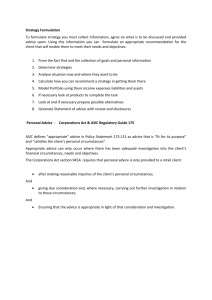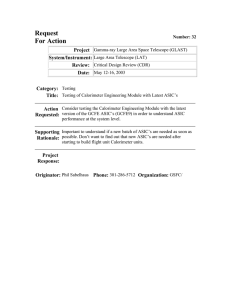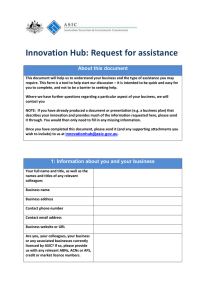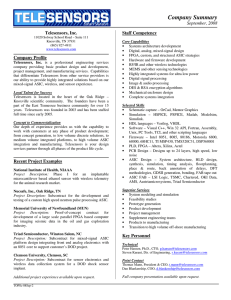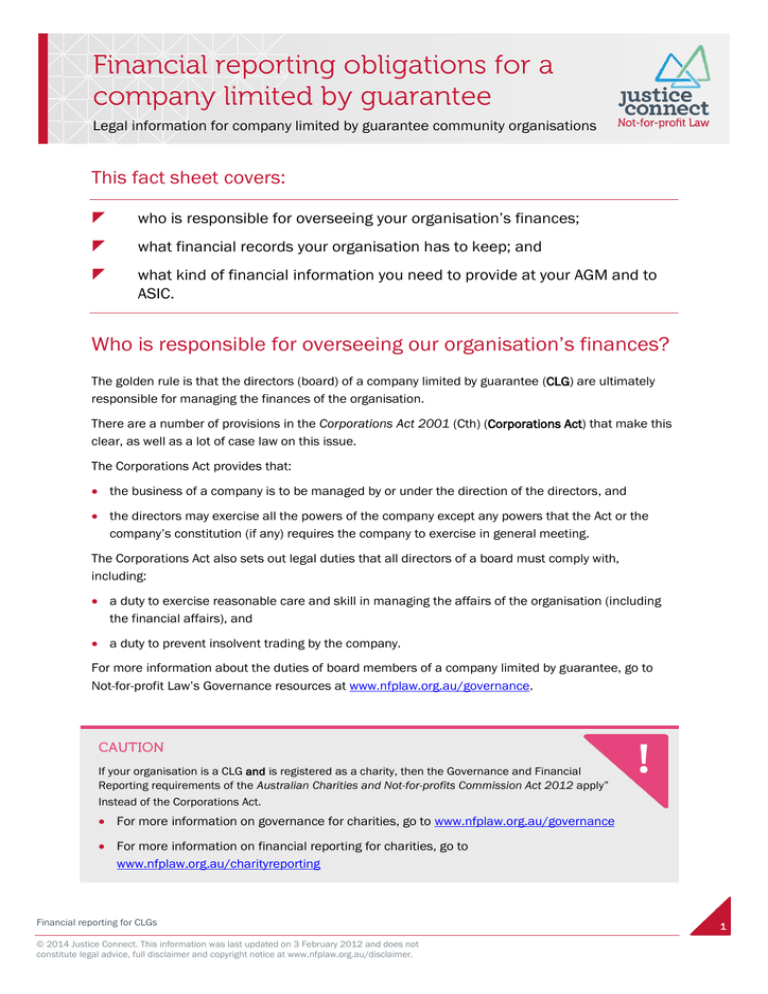
Legal information for company limited by guarantee community organisations
This fact sheet covers:
who is responsible for overseeing your organisation’s finances;
what financial records your organisation has to keep; and
what kind of financial information you need to provide at your AGM and to
ASIC.
Who is responsible for overseeing our organisation’s finances?
The golden rule is that the directors (board) of a company limited by guarantee (CLG) are ultimately
responsible for managing the finances of the organisation.
There are a number of provisions in the Corporations Act 2001 (Cth) (Corporations Act) that make this
clear, as well as a lot of case law on this issue.
The Corporations Act provides that:
the business of a company is to be managed by or under the direction of the directors, and
the directors may exercise all the powers of the company except any powers that the Act or the
company’s constitution (if any) requires the company to exercise in general meeting.
The Corporations Act also sets out legal duties that all directors of a board must comply with,
including:
a duty to exercise reasonable care and skill in managing the affairs of the organisation (including
the financial affairs), and
a duty to prevent insolvent trading by the company.
For more information about the duties of board members of a company limited by guarantee, go to
Not-for-profit Law’s Governance resources at www.nfplaw.org.au/governance.
If your organisation is a CLG and is registered as a charity, then the Governance and Financial
Reporting requirements of the Australian Charities and Not-for-profits Commission Act 2012 apply”
Instead of the Corporations Act.
For more information on governance for charities, go to www.nfplaw.org.au/governance
For more information on financial reporting for charities, go to
www.nfplaw.org.au/charityreporting
Financial reporting for CLGs
© 2014 Justice Connect. This information was last updated on 3 February 2012 and does not
constitute legal advice, full disclaimer and copyright notice at www.nfplaw.org.au/disclaimer.
1
Can't we just leave all this financial stuff to the Treasurer?
No - if you are a director on a board, the law is clear that all board members are responsible for
managing the company's finances.
The treasurer (or financial officer – or whatever other name is given to the position) is generally
charged with the task of ensuring that financial transactions are properly recorded and reported on.
The treasurer presents financial reports at board meetings. It is important that these reports are easily
understood by all the board members because they are all responsible for keeping a check on the
finances of the organisation.
While the treasurer may not be able to do all these daily duties personally, it is the responsibility of the
treasurer to ensure that good systems are in place to allow these tasks to be done efficiently and in a
foolproof manner.
Other tasks of the treasurer may include:
making sure finances are well planned by preparing an annual budget and then regularly
monitoring this budget to see that the organisation is staying within it;
making sure that the books are up to date and in order – this means that there is a proper record
of all payments and money received, and that accounts are reconciled at least once a month
taking reasonable steps to make sure that the organisation's finances are arranged so as to
prevent funds from being stolen or misused, and
ensuring that the necessary information and account books are ready for a financial statement to
be prepared (and if necessary reviewed or audited) at the end of the year.
What financial records does our organisation have to keep?
Every community organisation must maintain adequate and accurate accounting records of its
financial transactions.
The Corporations Act requires that a company must keep written financial records that correctly record
and explain its transactions, financial position and performance, and enable true and fair financial
statements to be prepared and audited. These records must be kept for 7 years.
'Financial records' are defined in the Corporations Act as including:
invoices, receipts orders for the payment of money, bills of exchange, cheques, promissory
notes and vouchers
documents of prime entry
working papers and other documents needed to explain the methods by which financial
statements are made up, and
adjustments to be made in preparing financial statements.
For more information about the kind of records a company should keep, your organisation should seek
professional accounting advice.
Financial reporting for CLGs
© 2014 Justice Connect. This information was last updated on 3 February 2012 and does not
constitute legal advice, full disclaimer and copyright notice at www.nfplaw.org.au/disclaimer.
2
The regulator for companies limited by guarantee, the Australian Securities and Investments
Commission (ASIC) have a guidance note called ‘What books and records should my company keep?’
which provides some basic background information (see Resources below).
What kind of financial information do we need to provide at the
Annual General Meeting (AGM)?
The Corporations Act 2001 (Cth) was amended on 28 June 2010 to introduce new measures
designed to reduce the financial reporting burden on smaller companies limited by guarantee. Under
the previous reporting regime, all companies limited by guarantee were required to have their
accounts audited by a registered company auditor.
As of (and including) the financial year ended 30 June 2010, companies limited by guarantee have
varying levels of financial reporting/auditing obligations, depending on which ‘category' or ‘tier’ they fit
into. There are three categories, defined by reference to the size of the company's annual revenue and
whether they are endorsed as a Deductible Gift Recipient (DGR) for tax purposes. For information on
DGR status, go to www.nfplaw.org.au/DGR.
Below is a table which sets out the categories and their minimum reporting obligations.
Tier 1 (known as
“small CLGs”)
Definition
Financial reporting requirements
Companies limited by guarantee with
annual revenue less than $250,000
without DGR status
Tier 2
Tier 3
Companies limited by guarantee with
annual revenue less than $250,000 with
DGR status
or
Companies with annual revenue over
$250,000 but less than $1 million (with or
without DGR status).
Companies limited by guarantee with
annual revenue over $1 million (with or
without DGR status).
No financial report required (unless
requested by 5% of members or by ASIC)
No Director's report required (unless
requested by 5% of members or by ASIC)
No audit/review of accounts required
(unless requested by 5% of members or
by ASIC)
No financial report required (unless
requested by 5% of members or by ASIC)
No Director's report required (unless
requested by 5% of members or by ASIC)
No audit/review of accounts required
(unless requested by 5% of members or
by ASIC)
Required to produce an audited financial
report
Required to produce a 'streamlined'
Director's report (less detailed than a full
Director's report)
Members to be notified of annual reports
(rather than automatic distribution)
*A ‘review' is less onerous than an audit, and can be conducted by an accountant with a practicing
certificate issues by the Institute of Chartered Accountants in Australia, CPA Australia or the National
Institute of Accountants - ie. the person does not have to be a registered company auditor.
Remember, these are minimum financial reporting requirements for a company limited by guarantee.
Companies that fall into the lower categories can choose to report at a higher level than they are
Financial reporting for CLGs
© 2014 Justice Connect. This information was last updated on 3 February 2012 and does not
constitute legal advice, full disclaimer and copyright notice at www.nfplaw.org.au/disclaimer.
3
required to (eg. ‘category 1' or ‘tier 2' companies can continue to have their accounts audited). Even
for 'tier 1' companies, it is good governance to prepare (at least) a financial report and present it to
members at the AGM.
There are various time provisions and deadlines which apply to the provision of the financial report to
members / tabling requirements. Your organisation should ensure that it understands and complies
with these timeframes to avoid penalties.
Also, it is important to keep track of your company's annual revenue so that you can assess its
reporting obligations from year to year. If your organisation makes more (or less) in a particular year,
or obtains DGR status, it may fall into a different reporting tier.
What financial information needs to be provided to ASIC?
The Australian Securities and Investments Commission (ASIC) is the regulator of all companies limited
by guarantee in Australia. The Corporations Act requires companies to report to ASIC by lodging its
financial, Director's and auditor's reports of a review or audit (if required) and an annual 'review fee' at
the end of every financial year.
Companies limited by guarantee may be eligible for a reduced annual review fee if it meets the criteria
under the definition of 'special purpose company' in the Corporations (Review Fees) Regulations 2003
(Cth).
A company is also required to review a statement of its company's details which will be sent to them
by ASIC and to notify ASIC of any changes to the details.
Timeframes for lodging these documents are strictly enforced and penalties apply for late filing. For
more information about reporting to ASIC – see Resources below.
Financial reporting for CLGs
© 2014 Justice Connect. This information was last updated on 3 February 2012 and does not
constitute legal advice, full disclaimer and copyright notice at www.nfplaw.org.au/disclaimer.
4
Related Not-for-profit Law Resources
The Not-for-profit Law Information Hub (www.nfplaw.org.au) has further resources on the following
topics:
Registering as a charity
Charity reporting
Governance
Meetings
Legislation
Corporations Act 2001 (Cth)
Related Resources
Australian Securities and Investment Commission (ASIC)
ASIC - What books and records should my company keep?
This ASIC guidance note is written primarily for directors of small proprietary companies but may be
a useful guide to basic financial record-keeping requirements.
ASIC - Annual statements
This ASIC page provides basic information about the lodgement of annual statements. It is not
specifically written for companies limited by guarantee and your organisation may wish to seek
specialist advice on reporting requirements.
ASIC - Financial reports
This page of the ASIC website has information about financial reporting (for all types of companies).
Institute of Chartered Accountants (ICA) – enhancing not-for-profit annual and financial reporting
Governance Institute of Australia - The Governance Institute has a series of good governance
guides, which includes information on financial reporting. They also provide a pro bono program to
assist with things like governance audits, board paper templates and annual report preparation.
Contact the Governance Institute for their guidelines on when a group is eligible for this free
assistance.
CPA Toolkit – CPA has a toolkit with two guides relevant to not-for-profit management.
QUT Approving Financial Statements – The Australian Centre for Philanthropy and Nonprofit
Studies at the Queensland University of Technology has a resource on nonprofit governance which
includes a page on approving financial statements.
A Not-for-profit Law Information Hub resource. Access more resources at www.nfplaw.org.au
© 2014 Justice Connect. You may download, display, print and reproduce this material for your personal use, or
non-commercial use within your not-for-profit organisation, so long as you attribute Justice Connect as author and
retain this and other copyright notices. You may not modify this resource. Apart from any use permitted under the
Copyright Act 1968 (Cth), all other rights are reserved.
To request permission from Justice Connect to use this material, contact Justice Connect at PO Box 16013,
Collins Street West, Melbourne 8007, or email nfplaw@justiceconnect.org.au.
Financial reporting for CLGs
© 2014 Justice Connect. This information was last updated on 3 February 2012 and does not
constitute legal advice, full disclaimer and copyright notice at www.nfplaw.org.au/disclaimer.
5

